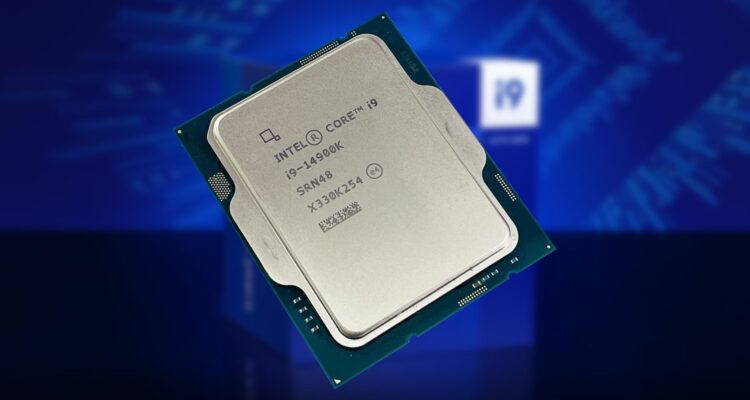When Intel launched its Core i9-14900K almost exactly one year ago, there was a lot of talk about how it was nearly the same as the 13900K that preceded it the previous year. But how does the i9-14900K stack up now that it’s the current gen defender, and is it the best option for building a high-end gaming PC right now?
Let’s first figure out just what this thing can do, and where we’re starting out.
The desktop we were provided by Intel is a custom-built no-spec-left-behind behemoth of a machine. There’s the i9-14900K in question, of course, a Gigabyte Aero GeForce RTX4090, 32GB of RAM, a 1TB M.2 SSD, all set on an ASUS ROG Strix Z790 motherboard and powered by a Thermaltake Toughpower GF A3 1200W PSU. All water-cooled with Corsair’s iCUE LINK H150i, and set in their 7000D case.
But we digress, we’re here to evaluate the Intel component above all else. The processor itself bases at 3.2GHz for its performance cores, while its efficient cores clock in at 2.4GHz. Most games will kick in the need for some extra power, so the fact that it can hit Max Turbo at 6.0 GHz doesn’t hurt, despite it jumping from 125W to just over 250W of power to do so.
That said, the mix of eight performance cores and 16 efficient cores is what makes the system hum. We all say we want more performance cores, however neglecting the efficient cores running all the background tasks so that the performance cores can handle the actual gaming in front of you is what makes things run smoothly.
So, with all that power, what can’t this machine do? Honestly, there’s not a lot on the list of things that we threw at the machine that it couldn’t handle. We’re going to assume that, since this is a gaming site and we’re reviewing a processor in a high-end gaming PC, that you’re probably looking to use this for games as opposed to high-end video rendering, though the latter is more than possible as well.
We tested some older games right through to the latest and greatest titles, and here’s what we found (all settings on, high/ultra, resolutions as marked):
Rainbow Six Siege: 168fps @ 1440p
Baldur’s Gate 3: 101fps @ 1440p, 67fps @ 4K, 37 fps @8K
Cyberpunk 2077: 107fps @ 1440p, 62fps @ 4K
Starfield: 108fps @ 1440p, 78fps @ 4K
Star Wars: Outlaws: 98fps @ 1440p, 61fps @ 4K
Senna’s Saga: Hellblade 2: 9fps @1440p, 61fps @4K
Some of the world’s biggest games in the last half (*checks notes* … what do you mean Rainbow Six Siege came out in TWO THOUSAND AND FIFTEEN?) decade all running comfortably above 60 frames per second at 4K resolution with max settings on across the board. Heck, even Baldur’s Gate 3 ran at 37fps in 8K resolution, and Hellblade 2, known for being one of the most taxing games, managed to eke out 61 frames at 4K. No slouching here, that’s for certain.
Looking forward, as games continue to push the envelope, there is no question that some 4K resolutions will begin to slip below 60 frames per second. That said, depending on the game, the difference between 1440p and 4K may not even be discernible to the human eye, and in games where frame rate is paramount, such as the aforementioned nine-year-old (!) Rainbow Six Siege, prioritizing frames over resolution is the wiser choice.
Many people look to computer thermals to evaluate processors and other components. And the workload pushed on the computer with this gaming probably got the CPU quite hot, but we’re not doing as much of a technical review as we are a functional one here. So, consider this us addressing thermals in the review. Of course the fans spun up rather soon after loading the games, and they didn’t spin down for a while after quitting, but we also pushed these games to their max for hours at a time.
So, to answer the very first question we posed: is the Core i9-14900K the best option for a high-end gaming PC right now?
It depends on what you’re targeting, really. From an all-out performance standpoint, until Intel releases its next generation chips, yes, the i9-14900K is the best of the best in Intel processors.
Will a game like Grand Theft Auto 6 run on the 14900K? Spectacularly well, without a doubt. Will it be pushed to its limits? No, not even to its limits. But will it start to see some performance degradation compared to what we’re playing today? Sure. Will any of it make a difference? Likely not. The 14900K is a powerful processor that will continue to be that for many years to come, and could be a mainstay in any gaming setup for at least the next few years.
From a pricing standpoint, given that the i9-13900K that preceded it is essentially the same thing, you can find it for about $100 less just based on the fact that it’s “last-gen.” That price is sure to drop even further as Intel’s new desktop processors are unveiled, though what performance and price looks to be there is anyone’s best guess right now.
The custom desktop we tested for this review was loaned to Eggplante by Intel. Read our reviews policy here.

